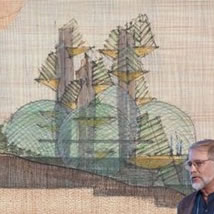 |
| I had a growing up which was unusual for its time. This opened a path for me which many in our country would be exposed to several decades later. The following captures a series of moments which I recall as being seminal to my development. These are annotated with comments from today’s perspective and links to additional stories and contextual materials. |
|
the explanation of how it was
never added up to the facts
|
| The first experience that I every had that made be aware of education as an activity and experience was my first day in the first grade. We were living in Orlando, Florida at the time. My mother had already taught me how to read and the book she used for this task was the the Rime of the Agent Marinere by Coleridge. This seemed perfectly natural to me and my mother explaned the text as we went. We read the work many tmes so I grew up on this notion of English and what a story was: |
Day after day, day after day,
We stuck, nor breath nor motion;
As idle as a painted ship
Upon a painted ocean.
Water, water, everywhere,
And all the boards did shrink;
Water, water, everywhere,
Nor any drop to drink.
|
|
| I was excited about the prospect of school and you can imagine my shock when, on the first day I was given my reader and it featured Jane, Dick and Spot the dog. “Look at Spot chasing the bouncing red ball” I read the book before the class started and could not make any sense of it. The first exercise of the day was to look at a cardboard placard about 18 inches high with a picture of a man in a gray suit carrying a briefcase with the word “FATHER” underneath. As my father was in the Army Air Force and wore a uniform I told the teacher that this did not look like my father and fond myself in the Principal’s office within minutes of the beginning of the school day. This was a well known private school and the Principal was a very smart lady. She instantly grasped that she had a problem on her hands after my short explanation about bouncing red balls and “all the boards did shrink” - I was capable of quoting Coleridge at length and thought that there was nothing unusual about it. At her suggestion, I spent my first semester of schooling in her office everyday and loved every minute of it. |
| After a few pleasant months of this personal tutoring, I was moved to a public school and was back to bouncing red balls and such things so I went to sleep until I encountered a teacher in the third grade who had the knack of teaching and woke me up - again, at a private school. I actually remember, sitting in the back of a classroom, the day when I woke up and realized that the magic was back and there was something to learn which was interesting. I “advanced” several grades that year from “behind” to “ahead.” Interesting notions, behind and ahead when you are this young. I remember being told how pleased everyone was that I was “applying” myself. My problem was that I could not figure out what I was doing that was different from before. When things were dull, I slept. When they were not or I was alone, I woke up. Heavy metaphysics for a 3rd grader. |
|
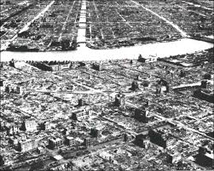 |
| Japan and the Philippines gave me my first direct experience of the consequences of war. A revelation - why would anyone ever create a circumstance that leads to this? 100,000 people died one night here and less than 18 months later I was greeted on the streets with friendship. |
|
| It was in a bed in the philippines that my real education began. It was at this time/space that I took on the self-aware, self-appointed-task that becoming knowledgeable was basically my responsibility and that parents and schools could help yet were in themselves not adequate to the task. Handing your child an encyclopedia may be dangerous. Today, there is the internet. In 1947 the Britannica was as good as it got. What would you think if, after being part of an Air Force family through WWII with friends whose father had died and after seeing the destruction in two countries, you read an article about US trade with Germany during the war? It kinda gets the thought processes going. I did not go to the 4th and much of the 5th grades because doctors thought I was going to die early. I was told that I would spend the rest of my life mostly in bed. I slowly worked my way out of this and finally rebelled in my high schools years. When I was nearly 40 and running 75 miles a week I was told that there must have been a mistake in the diagnoses. It seems that there was a mistake in 1945 and each succeeding doctor took it as a given until the facts just did not hold up. I never felt sick. Things like this make you tend to question authority and “expertise.” |
|
 |
| Things that fly made up a big part of my life. My step-father flew the B-24 and B-17 in the war. My first fight was in the co-pilots seat of a B-25 with my step-father flying in Texas right after the war. Flying has been deadly dull ever since. The one shown on the left looks much like it and is still flying. It gives rides - try it! |
|
| My grandfather was the biggest single influence in my early years when it came to problem solving and building things. He taught by example how to approach a creative task. He also taught me how to drive and take care of an automobile. By comparison the Cub Scouts and Boy Scouts did not make it. Nor did school for many years afterward. It was not until military school in the 8th and 9th grades that school other than sports (which I slowly overcame parental wisdom and became active in). My biggest problem with school was I could never figure out why anyone was there and want the deal was. I thought the idea of it was to learn. It seemed that the vast majority of teachers and students thought that is was about something else - I was never able to break the code. We moved often, being Air Force and it seemed that the code was different everywhere I went. And everywhere, it seemed the locals though that their’s was the only way. What was happening on the military base and off of it was night and day - two entirely different worlds. On base it was about mission and applying knowledge to getting the mission accomplished. It was a technical, fact-based, global community. Off base base, anywhere was about this spot of the world, making money and the distractions of the moment. After a lifetime in the Air Force, my grandfather retired with a “serious heart condition” which he did die of 20 years later in his eighties - another brilliant piece of medical analysis. It was sad to see him fad away, year by year, which so much accumulated knowledge with no place to go. I wondered why a society would do this. One time he got a job inspecting jet engines for a well known defense contractor. He insisted that that every part meet spec and was fired for being “too” exact. It seemed that building as contracted was perceived to be too expensive. In his prior life the specification was the specification and people died when it was not met - one might fail trying to do it but never deliberately. He never did find a place post Air Force and died one day as mentally sharp as ever but bored to death. I determined that this would never happen to me - that I would never be in the position that the work I loved could be held hostage by arbitrary power. This did take me out of the main stream as it turned out but this is ahead of our story. |
| It was in The San Francisco Bay Area after the Philippines and before washington DC that I discovered architecture and with it all hope of a normal life was lost. In eight years I would be working in architecture and eight years after that running a 22 million dollar project in new York City. I did not get the knowledge to do this work by normal educational means. In my experience of it, I did not choose architecture - it chose me. This seems quaint from today’s perspective - nevertheless this is my memory of it. In later years, I tried to run away from architecture on a few occasions yet this never worked. It kept coming back as demanding as ever. At times it demanded too much. |
|
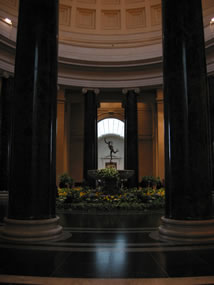 |
Washington DC was the first city in which I ever spent a great deal of time. The Mall, with the many museums was my playground. The National Art Gallery became a favorite. I would sit in there for hours - It was my first public space.
Whenever I go to Washington D.C. I go to the same court yard with the columns, plants and fountain. I consider it “my” place and I am grateful for the sense of commonwealth that built it and keeps it, today, as immaculate and serene as the first time I saw in 1950.
I have, from my first experience of it, considered this building to be the most perfectly built structure I have ever seen. It remains my measure of construction excellence. I learned several things from this building. I learned that people will and can put great effort into housing their historical treasures and making these accessible to everyone by simply walking in the door. I learned that building could be built to the resolution of the human eye no matter that the components included marble pieces which weight tons. No excuse for sloppy building and it is the effort to reach perfection which is a major way that the right attitude and energy is invested into the structure.
The personal times alone to observe, reflect and think were - and are - my most important moments of discovery.
|
|
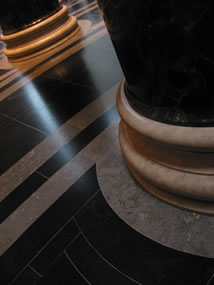 |
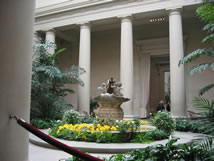 |
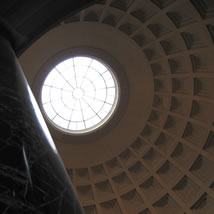 |
pictures taken in 2005 |
| My formal education, after returning from the Philippines until 1953 was a series of schools in Virginia and Texas which had little to offer the intellect. They were neither good or bad - they were nothing and I do not recall one student and only one teacher who seemed to have a slightest interest for learning. For the teachers it was a job and for the students a place to hang out for most of the day. The attitude was overwhelmingly parochial and I could not resolve this with my WWII experiences. Without question, sports were the best part of the the curriculum. I enjoyed the sports and pursued my interest in architecture as the the integrator of my continuing self-taught explorations in education. I slowly learned that it was not wise to discuss these pursuits with my contemporaries. The one teacher did not “teach” his class at all. The setting was a summer school course on literature full of students who had failed it during the regular year. In my time in the Philippines, I had of course missed this class and the State of Virginia had decided that I could not advance without it. The teacher knew that only a few cared at all about the subject. So, he read to the class though all of the periods. No tests, no dialog except when a student wanted it. The only rule was that the class had to be quite and he imposed this with vigor. He was a marvelous reader and chose great material. What a pleasure it was. My personal reading remained eclectic and was all adult books. Back in school, with school books I continued my practice of reading the text of each one I was given in the first week of class and then coasting through the course. I noticed that there were large disparages between the “student” books and the same subjects from the general library and neither seemed to explain the world I saw emerging around me. This world seemed full of opportunity that was being missed - totally ignored. What I remembered most from this time was being told that my ideas would never be possible and that I was too idealistic. I was also accused of being “too logical.” Childhood seemed, like a time of perpetual waiting with no real future but at least a hope. The hope that I would find somewhere serious people interested in serious things. |
Day after day, day after day,
We stuck, nor breath nor motion;
As idle as a painted ship
Upon a painted ocean.
Water, water, everywhere,
And all the boards did shrink;
Water, water, everywhere,
Nor any drop to drink.
|
|
| As I have related elsewhere, this youthful vision was dashed in my first work experiences. Vision is important for it propels you toward a new future. It is also important to take the world as it is and not allow your vision blind you to reality. These are not easy distinctions for extremes can create the dreamer without practicality or the cynic without hope. A proper educational experience helps balance these extreme tendencies. This balance was not present in my youth nor do I believe it is, today, for the majority of children even in those parts of the world which are considered to have good education. What education I received did not prepare me live in the world I was entering let alone in the world which was emerging. |
|
|
| Return To The Student Environment |
|
|
|
|
| GoTo: Masters Campus Master Plan |
|
|
|
|
Matt
Taylor
Nashville VCBH Studio
March 2, 2008
SolutionBox
voice of this document:
VISION • PHILOSOPHY •
PROGRAM |
|
click on graphic for explanation of SolutionBox |
posted
March 2, 2008
revised
February 10, 2011
• 20080302.999957.mt • 20080309,646417.mt •
• 20080310.981092.mt • 20080322.000012.mt •
• 20080329.444401.mt • 20101202.888810.mt •
• 20110210.111100.mt •
(note: this document is about 20% finished)
|
|
|